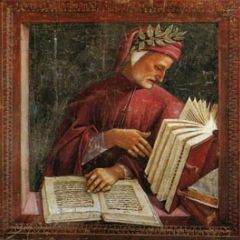Dante's Library: Rebuilding a Medieval Network of Knowledge

2014 to 2016
Emerging Networks
Although one would think that simple questions such as “What did Dante’s copies of Virgil and Aristotle look like?” and “What images of the Crucifixion had he seen?” have already been answered, they remain surprisingly unresolved. Indeed, how Dante came to the vast knowledge that makes his works a summa of medieval learning continues to be the subject of vigorous debate. Dante's Library: Rebuilding a Medieval Network of Knowledge seeks to inform that debate by reconstructing in virtual form what would have been Dante's library in the broadest sense of the word—the literary, theological, philosophical, political, and scientific texts that he might have read and the artwork he might have encountered. Drawing on existing digitizations supplemented by some of its own, the project will create an online collection of the material that shaped Dante's vision.
Since Dante wrote before the emergence of the modern disciplines, this project necessarily involves scholars from a range of fields, including Italian, French, art history, history, philosophy, religion, and music. The goal is not simply to catalogue the material but also to curate it. Brief texts will introduce each work, manuscript, or image, giving a sense of its context, its significance, and its connections to Dante.
Undergraduate students will be integral to the collaboration. They will be invited to frame research questions and then produce knowledge, either in the form of broad topical research or analysis of specific manuscripts or objects. Undergraduates bring a fresh perspective, often posing questions that scholars have taken for granted. Their research questions will inform what materials or models will be part of the site. These questions might involve the reconstruction of a particular kind of civic or sacred space in Florence or Rome, the mapping of Parisian philosophical, theological, or literary debates, or the analysis of the manuscripts that receive and transform medieval Arabic commentaries on Aristotle.
The web site that results will be a valuable resource for students and teachers at all levels, both at Duke and at other institutions. By bringing this disparate material together in one place, it will not only facilitate new readings of Dante but also serve as a window onto the medieval and Renaissance worlds more broadly.
People
|
PhD Student in Italian Studies |
Associate Professor of Italian Studies |


